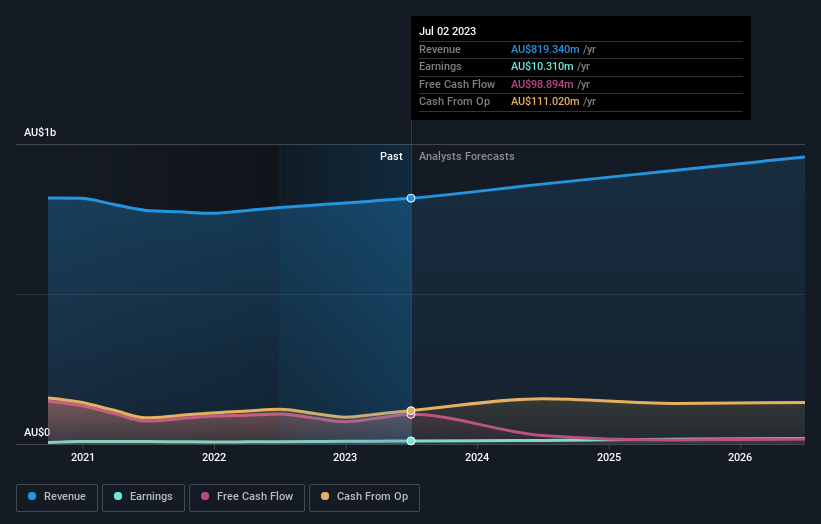Reject Shop's (ASX:TRS) investors will be pleased with their decent 94% return over the last five years
The Reject Shop Limited (ASX:TRS) shareholders might be concerned after seeing the share price drop 10% in the last quarter. But that doesn't change the fact that the returns over the last five years have been pleasing. Its return of 77% has certainly bested the market return!
So let's assess the underlying fundamentals over the last 5 years and see if they've moved in lock-step with shareholder returns.
Check out our latest analysis for Reject Shop
While markets are a powerful pricing mechanism, share prices reflect investor sentiment, not just underlying business performance. One imperfect but simple way to consider how the market perception of a company has shifted is to compare the change in the earnings per share (EPS) with the share price movement.
Reject Shop's earnings per share are down 14% per year, despite strong share price performance over five years.
Essentially, it doesn't seem likely that investors are focused on EPS. Since the change in EPS doesn't seem to correlate with the change in share price, it's worth taking a look at other metrics.
We doubt the modest 1.3% dividend yield is attracting many buyers to the stock. It is not great to see that revenue has dropped by 0.03% per year over five years. It certainly surprises us that the share price is up, but perhaps a closer examination of the data will yield answers.
The graphic below depicts how earnings and revenue have changed over time (unveil the exact values by clicking on the image).
We know that Reject Shop has improved its bottom line over the last three years, but what does the future have in store? If you are thinking of buying or selling Reject Shop stock, you should check out this FREE detailed report on its balance sheet.
What About Dividends?
When looking at investment returns, it is important to consider the difference between total shareholder return (TSR) and share price return. The TSR incorporates the value of any spin-offs or discounted capital raisings, along with any dividends, based on the assumption that the dividends are reinvested. It's fair to say that the TSR gives a more complete picture for stocks that pay a dividend. As it happens, Reject Shop's TSR for the last 5 years was 94%, which exceeds the share price return mentioned earlier. This is largely a result of its dividend payments!
A Different Perspective
We're pleased to report that Reject Shop shareholders have received a total shareholder return of 14% over one year. Of course, that includes the dividend. However, that falls short of the 14% TSR per annum it has made for shareholders, each year, over five years. It's always interesting to track share price performance over the longer term. But to understand Reject Shop better, we need to consider many other factors. For instance, we've identified 1 warning sign for Reject Shop that you should be aware of.
We will like Reject Shop better if we see some big insider buys. While we wait, check out this free list of growing companies with considerable, recent, insider buying.
Please note, the market returns quoted in this article reflect the market weighted average returns of stocks that currently trade on Australian exchanges.
Have feedback on this article? Concerned about the content? Get in touch with us directly. Alternatively, email editorial-team (at) simplywallst.com.
This article by Simply Wall St is general in nature. We provide commentary based on historical data and analyst forecasts only using an unbiased methodology and our articles are not intended to be financial advice. It does not constitute a recommendation to buy or sell any stock, and does not take account of your objectives, or your financial situation. We aim to bring you long-term focused analysis driven by fundamental data. Note that our analysis may not factor in the latest price-sensitive company announcements or qualitative material. Simply Wall St has no position in any stocks mentioned.

